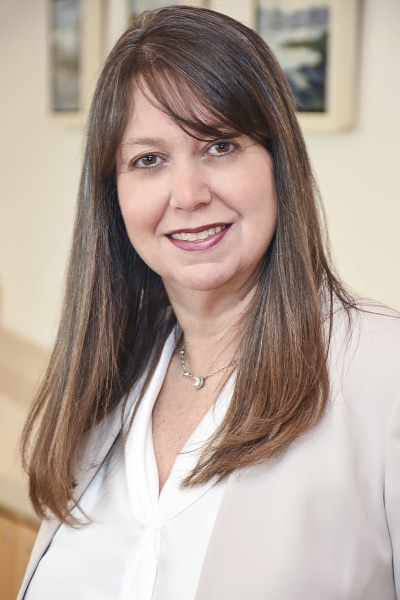
It was one for the history books. Spun off by Royal Bank of Scotland (RBS) in the turbulent wake of the 2008 financial crisis, Citizens Financial Group, Inc. had successfully navigated its bid for independence in 2014, and in turn it completed the largest traditional bank IPO in the history of the United States.
“That was one of those unbelievable moments; it was surreal,” says Robin Elkowitz, Citizens’ executive vice president, deputy general counsel, and secretary. “You’re standing there waiting for the New York Stock Exchange bell to ring that morning, and you realize that you were a part of the process. And you think of everything that Citizens had to navigate in order to get it done—not just the technical requirements of listing the company on the stock exchange but also the separation from our parent entity and overcoming the trying financial times. Everybody was very proud that day.”
Having previously served as managing director and deputy general counsel for RBS, Elkowitz was tapped during the divestiture of Citizens Financial Group for the enviable—albeit potentially tricky—task of crafting that company’s public corporate governance function from scratch. It was a big career shift, but it also presented Elkowitz with the opportunity to push the limits of her leadership abilities and achieve something truly notable alongside her team.
“I had served in a governance function for many years at various companies, but this was the first time where I was responsible for actually establishing the function,” she says. “I learned a lot about myself and what I felt I needed to do to be a good leader. Luckily, I had many good examples to follow. I’m very appreciative to Bruce Van Saun, our CEO, and to the board for having faith in me and giving me the opportunity to do it. I think taking on that management role and finding out what works to make a functional and cohesive team was one of the biggest learning experiences for me in my career.”
That learning process, she says, happened in a few, distinct phases.
1) Outlining an Organization
In the lead-up to the company’s IPO, Elkowitz and her team, in conjunction with other departments, set their sights on developing a robust structure that would ultimately be able to support the company’s future endeavors.
“My team and I—who are part of the legal function—had to create a governance function, and the company had to build an investor-relations department as well as enhance its corporate-reporting function,” Elkowitz says. “A main focus of my team during that time was to meet the many technical regulatory requirements for the IPO and help set the stage for getting the company ready to be listed on the New York Stock Exchange [NYSE]. A lot of planning had to happen for that, so there were a lot of moving parts at that time.”
2) Bringing Members Aboard
To prepare the company for its listing on the NYSE, Elkowitz’s team instituted fundamental operating precepts such as charters, bylaws, and corporate-governance guidelines. They also established a shareholder-outreach program and helped to bring on several new directors to Citizens’ board of directors.
“On the board administration side, we looked for people who were detail oriented, task oriented, had good communication skills, and had the ability to work beside board members and senior management,” Elkowitz says. “We wanted people who didn’t have a ‘me me me’ attitude but more of an understanding that this could only really work as a team. The overall philosophy was one of collaboration, which was key in working with our colleagues in the rest of the legal department and the bank as a whole.”
Although her team and the company were ultimately successful in their efforts, the period wasn’t without its challenges. “We really had two very daunting tasks that were happening at the same time and on a tight timeframe: the separation process from Royal Bank of Scotland and the process of going public,” Elkowitz says. “We also had to overcome the challenging economic times. The markets were very much in flux, and we needed to gauge the best time and price for our transactions to take place.”
3) Getting Back to the Day to Day
Of course, after the first round of funding, her job had just begun. “On day two, it was back to work to gain full independence and to support the business in achieving its financial goals,” Elkowitz says. “Now we had the reins of our own destiny, and it was up to us to invest in what we thought was necessary and to evaluate what our shareholders and customers thought was important. We’ve been building ever since.”
In 2016, the company became part of the S&P 500 and the Fortune 500. “Our governance team was also named a finalist for Governance Team of the Year by Corporate Secretary magazine,” Elkowitz says. “We thought that was a great honor after only being public for two years. Our board has also received honors in the governance space. We were recognized in 2017 and 2018 by Women on Boards 2020—which recognizes gender diversity on boards—because our board is 25 percent female.”
4) Looking to the Horizon
Now in year four, Elkowitz and her team continually work to cultivate the systems they’ve developed. “We’re well on our way, and we’re working to improve and enhance our processes,” she says. “A year or so ago, I think we felt like we’d finally turned a corner, in that we could be less reactive and more proactive in our approach to things.”
It’s a long way from where her team began, and the opportunities ahead are myriad. “At first, we just wanted to make sure we were meeting all of our regulatory requirements, being accurate, and being on time,” she says. “Now, we’re able to step back and think about how we can present things in a more refined way, and we can look at what other companies are doing, what our peers are doing, and, most importantly, what we want to do.”
Expertise Spotlight:
Debevoise & Plimpton’s Banking Group is ranked among the leading practices in the United States, advising banks, brokers, and other financial institutions—including Citizens Financial Group—on the full gamut of regulatory, litigation, and transactional matters. As banking industry regulation has proliferated in the wake of the financial crisis, the Debevoise Banking Group has grown to more than twenty lawyers with expertise that spans the landscape of regulatory regimes and agencies.
Leveraging its deep market knowledge, the group provides unmatched counsel to financial industry clients on mergers and acquisitions, US and international regulatory and compliance issues, enforcement matters, broker-dealer matters, derivatives, capital markets activities, and new product development. The group combines a nuanced understanding of the regulatory terrain with Debevoise & Plimpton’s strong litigation and transactional resources. The result is an ability to handle the most sophisticated and multifaceted issues, manage critical enforcement and compliance challenges in the evolving regulatory environment, and lead complex and sophisticated transactions.
With lawyers in New York, London, Hong Kong, and Washington, DC, the group has close relationships with—and extensive experience advocating before and negotiating with—regulators in the US, the United Kingdom, Asia, and other jurisdictions, including the U.S. Federal Reserve and other US banking regulators, the Consumer Financial Protection Bureau, the Department of Justice, state attorneys general, and the New York Department of Financial Services.
***
Debevoise & Plimpton:
“Robin is an innovative leader with strategic insights and extensive industry knowledge. It is always a pleasure to work with talented attorneys like her.”
—Gregory J. Lyons, Partner


